Thomas E. Ricks's Blog, page 187
April 30, 2012
Pungent footnote of the week, plus a bizarre footnote that I just can't figure out
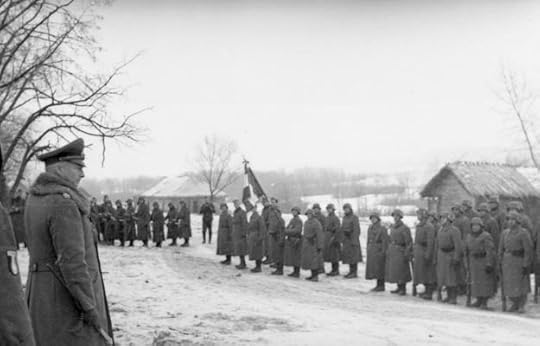
I saw this on page 389 of Jean Edward Smith's new
biography of Eisenhower: "Army Group
B had three wartime commanders: Rommel, von Kluge, and Model. All three
committed suicide." (In the photo, that's von Kluge with Vichy
France troops in Russia.) That's quite a track record.
But on page 568, though, Smith has a footnote I just don't
understand. He writes that "President Obama initially chose Marine Corps
general James L. Jones [as national security adviser], the first nonacademic to
hold the post since the Eisenhower years." What?
How could the following people be considered "academics"? Brent Scowcroft,
Richard Allen, William Clark, Robert McFarlane, John Poindexter, Frank
Carlucci, Colin Powell, Sandy Berger, and Stephen Hadley. In fact, by my count,
the majority
of national security advisors have not been academics.
Aid to Obama? Another Israeli security official speaks out against attacking Iran

This time it was the former
head of the Shin Bet, the internal security agency. Apparently it was the
first time Yuval
Diskin has spoken in public about the Iran issue.
These
statements are more significant than they may seem, because they provide support
to skeptics of the official Israeli position that Iran must be attacked soon.
And so I think this eases election-year pressure on President Obama: All he has
to say to hawkish critics is, What do you
think you know that the chief of the Israeli defense forces and the former head
of Shin Bet don't know?
April 27, 2012
The six stages of adjusting to working with Iraqi and Afghan security forces
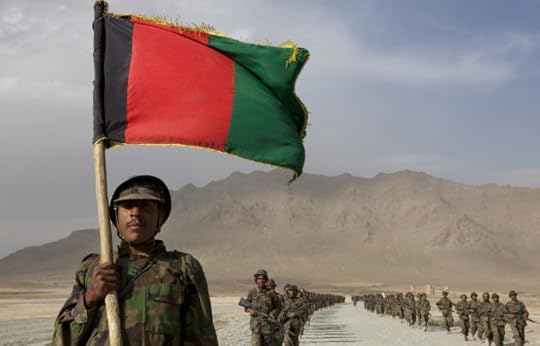
The other day while riding on the Washington, D.C., Metro I
jotted down this summary of a typical American commander's mode of dealing with
his Iraqi or Afghan counterparts in local security forces:
1. Upon arrival: "Ok, Ahmed, Mohammed, whatever you name is,
there's a new sheriff in town -- and
you're looking at him."
2. Weeks later: "Colonel Localguy, Major Otherguy, please
sit down. Here is a Powerpoint briefing on what you're gonna do."
3. Weeks more later: "Ok, I got it. I can be sensitive! So,
colonel, this is what we are gonna
do."
4. Many weeks more: "Now that I am beginning to understand
this place, this is what I think we should do."
5. Months into the tour: "I'm at my wits' end. What do you think we should do?"
6. Near end of tour: "Before we leave, is there anything I
can do to help you achieve your goals?"
Repeat with each
rotation until the American people tire of the war.
Or,
as Maj. Norman Stephenson put it in a recent Leavenworth
interview, "The biggest lesson that our military needs to take away from
this experience was that until we were ready to trust, train, and recognize the
Iraqi military and police force for what they were, we didn't help the country.
Upon that, we recognized what the people needed was an Iraqi Army, an Iraqi
government, and an Iraqi police force to protect and work for them, not an
American Army to protect them and work for them."
I read my list of six stages to a colonel I know who
commanded a battalion in Afghanistan. "Yep," he nodded. "Why can't we start
with number 6?" Rotation of commanders, he noted, is no way to conduct a
counterinsurgency campaign. More about that in my
book later this year.
Quote of the day: 'So what?'

Army Capt. D.J. Skelton in a good Stars
& Stripes profile on losing
an eye and part of the left side of his head. "So I spend the rest of my life bumping into things on my
left . . . So what." He's heading to China as a foreign area officer.
Rebecca's War Dog of the Week: France loses a mighty chien de guerre
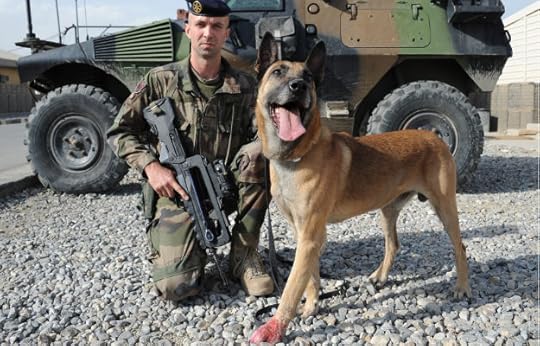
By Rebecca Frankel
Best Defense Chief Canine Correspondent
Last week, France lost one of the fiercest among
their canine fighting force, the 132e
Bataillon Cynophile de L'Armee de Terre. On April 17 Fitas, an
eight-year-old Belgian Malinois, succumbed to injuries he sustained while
serving in Afghanistan.
According to the Armée
de Terre's Facebook page
in April of last year, while on patrol in Afghanistan, Fitas uncovered an
ambush awaiting French troops. Apparently, the dog not only alerted to the
danger, but was key in warding off the insurgents during the attack that
followed. Unfortunately, during the upheaval, Fitas was captured and held
captive for months.
My French is a little rusty but from what I could tell,
there are at least two accounts of what happened after that fateful night. As
one story
goes, Fitas was found (some versions say rescued) by the Afghan National Army
and returned to his unit stationed at Camp Warehouse near Kabul. According to Facebook, the brave dog escaped
on his own mettle though it doesn't detail how he made his way back to his
fellow troops last August.
Sadly, what finally took down this warrior dog was an injury
he suffered either during the initial attack or while poorly treated during his
captivity. Reports say Fitas contracted some kind of disease or infection from
the wound, something that was apparently too pernicious or too far advanced to
treat.
For his bravery, Fitas received commendation from General
Ract Madoux, who awarded the dog with the Gold Medal of National Defense with
the Silver Star.
In the above photo, Fitas poses with a
French soldier in Kabul on Sept. 10, 2011. Note his front-left paw, the site of
his injury, easily distinguished by the reddish coloring.
Rebecca Frankel, on leave from
her FP desk, is currently writing a book about
military working dogs, to be published by Free Press.
April 26, 2012
Patton on mission command -- or not?

When I first read the passage below, I thought Patton was
writing about mission
command. But as I typed this in, I began to wonder if he simply is
prescribing rote learning of a military repertoire. What think you?
From the
same 1932 paper I quoted the other day:
The successful use of such [small, mobile, self-contained]
units will depend on giving great initiative to all leaders in actual command of men.
. . . Under such circumstances the solution of the command
problem would seem to rest in using the method called by the British: "The
Nelsonian Method," or by our Navy, the method of "Indoctrinated initiative."
This system is based on the belief that the: "Best is the
enemy of the Good." That a simple mediocre solution applied instantly is better
than a perfect one which is late or complicated.
Among leaders of whatever rank there are three types: 10 percent
Genius; 80 percent Average; and 10 percent Fools. The
average group is the critical element in battle. It is better to give such men
several simple alternative solution which, by repeated practice, they can
independently apply than it is to attempt to think for them via the ever
fallible means of signal communications."
Quote of the day: A soldier's deepest wish

From Six Weeks, the
book about British junior officers in World War I that I've mentioned
before, here is a stanza from a poem by Sub-Lt. A.P. Herbert, who
fought at Gallipoli, and later saw his battalion destroyed at the Somme:
We only want to take
our wounds away
To some shy village
where the tumult ends,
And drowsing in the
sunshine many a day,
Forget our aches,
forget that we had friends.
I really like those lines. The emotion they convey is more
complex than it may first appear, especially the last five words.
Afghanistan: As good as it gets?
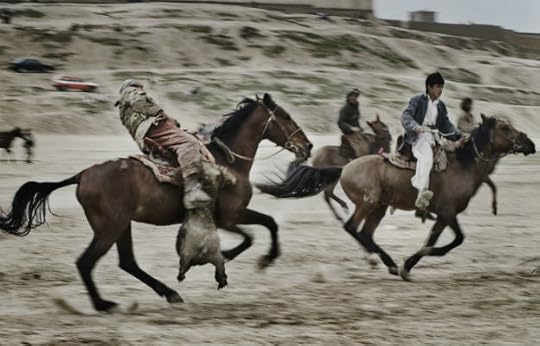
By Gary Anderson
Best Defense chief buzkashi
correspondent
Before
we have an argument over who lost Afghanistan, we should make sure it is really
lost. I'm sitting in Afghanistan as I write, and I can say that it hasn't gone
anywhere. A score of pundits, many of whom have never been here, have written
the place off.
At some
point, we need to ask ourselves what we really expected from Afghanistan. As I
remember it, we went in to rid the country of al Qaeda and associated foreign
fighters. In 2001, the country was ruled by the Taliban, and they were giving
sanctuary to Bin Laden and his minions; so we toppled their government, and put
one in that would not tolerate al Qaeda. In the
process, we decimated the terrorists' haven there. That is pretty much where we
are today. So what is lost?
Somewhere
along the line, we got into mission creep. Instead of being satisfied with a
relatively stable but likely decentralized state, we encouraged our local
allies to build a strong, centralized democracy on European lines in a country
that lacks the infrastructure and traditions to have anything of the sort. That
vision may simply have been a bridge too far. In its most peaceful periods, the
entity that we call Afghanistan was more a region of communities that a nation-state. Those rare periods when it came under strong central rule were often the
result of an exceptionally energetic and militarily capable leader, and central
governance rarely survived that individual's passing. Afghanistan differs from
Iraq in that respect. With its relatively flat terrain and fairly
sophisticated road system, Iraq has always had a strong tradition of
centralized rule.
Just
because Afghanistan is not becoming France or Germany overnight, we should not infer
that it is incapable of keeping foreign fighters out of the areas that its
security forces control. Many provinces and districts are remarkably well ruled
at the local level, even when the government in Kabul fails to give them the
type of support that they desire or believe they deserve. Most of these places
fall within the security bubble provided by the Afghan National Army (ANA).
Although imperfect and immature, the ANA has become the most respected Afghan
governmental institution, and many of its commanders show an ability to work
with local governments and non-governmental organizations that exceeds the
standards of Central Asia and the Middle East. That may be as good as it gets
in the near term.
As to
the places that the Afghan surge never reached, we may need to rely on other
means than conventional governance to keep al Qaeda and its surrogates out.
That may come in the form of an agreement with the Taliban in areas that they
still control to exclude al Qaeda and other foreign jihadists. We might also
employ some combination of paying local militias to hunt the foreigners down
and counter-terror operations by special operations forces.
While
less than optimum, Afghanistan today presents much less of a haven for
international terrorism than its neighbor Pakistan. Contrast Afghanistan with
Somalia, a country we decided to abandon to its own fate in 1993 when we
decided that it was not a threat to United States national security. Today, we
see an active network of al Qaeda affiliates operating openly. Lacking even the
semblance of a national government to work with or bases with which to launch
counter-terror strikes, we are forced to tinker at the margins of a growing
base for international terrorism. There are countries on the verge of becoming
like Somalia, but that are not as bad off as Somalia is, or Afghanistan was,
when we first arrived.
The
real benefit of the lessons we have learned in Afghanistan through the
expenditure of much blood and treasure may be in keeping places from Yemen and Mali
from getting to the point where Afghanistan was in 2001. If, by using a
relatively small cadre of Special Forces trainers and civilian advisors, we can
stabilize troubled states before they fail or fall to radical Muslim
insurgents, we should do so. In that regard, our experience in El Salvador in
the eighties and early nineties of the last century may be more instructive
than Iraq in the counter-terror operations of the future. However, we have
learned much from both Iraq and Afghanistan. We largely know what works and
what doesn't. The only tragedy of Afghanistan would be to forget what we have
learned as we seemed to after Vietnam.
We
haven't lost Afghanistan, it was never ours to lose, but we have given them a
chance to decide what they are going to be. That's likely to be as good as it
gets.
Gary
Anderson, a retired Marine Corps Colonel, is an adjunct professor at the George
Washington University's Elliott School. He has served in both Iraq and
Afghanistan as a counterinsurgency and governance advisor for the Department of
Defense and the Department of State.
April 25, 2012
What the Marines in this photo were thinking: A Best Defense mystery solved!
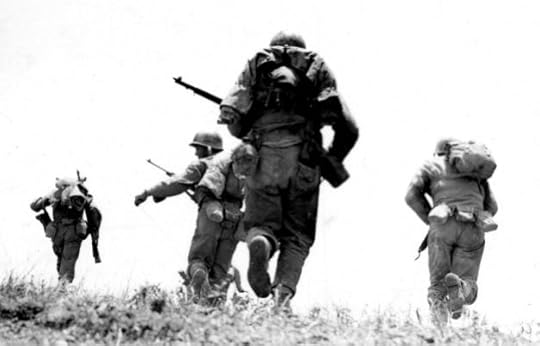
Last year, Hunter and Eric Hammel and dozens of others held a
thoughtful and robust debate on this blog about what the Marines in this
photograph, taken on Okinawa on May 1, 1945, near the end of the war, were
thinking as they charged a Japanese position.
Hunter: "I can't
help but think, through my cynical eyes, that the thoughts running through
these guys heads were "1) this shit sucks 2) we're all gonna die 3) we're
skylining like mofos.""
Hammel: "So the thing I think the four were going over
in their heads were: Can I drop fast enough if the other side opens fire? If
not, will it be quick? Because, with me or without me, we are winning."
Now, by chance, I think I have the answer to the question.
The other day I picked up Battleground
Pacific, a new memoir by Sterling Mace (of K/3/5) and Nick Allen.
Flipping through it, trying to decide whether to read it, I noticed the
photograph in question. And then on page 269, I read what he was thinking as he
moved toward a Japanese position:
"As soon as we reached southern Okinawa on May 1,
1945 -- WHAM! -- they let us have it ... Zigzagging at a run ... I dropped
into an army-made foxhole. Other marines did the same, peeking out over the
rims of their holes and flash! A
volcano erupted and sent so much muck into the air, there was only a giant wall
of brown before our eyes. I closed my lids, and all I saw was red.
They've got
this whole place zeroed in. Realization hits hard. There's nothing they can't hit out here.
So, that seems to be
what he was thinking: We move or we die.
Let's move.
Israeli army chief of staff: Iran isn't building a nuclear bomb and is rational

Lt. Gen. Benny Gantz’s comments
would appear to undercut the argument that the Israeli prime minister has been
making for a preemptive attack on Iran. He also said that 2012 is not
necessarily the year when Israel must act. “This is a critical year, but not necessarily 'go,
no-go.'"
He
also said that, “I think the Iranian leadership is composed of very rational
people.”
I think this is good news.
The guy on the right in the photo looks pretty tough. I
wonder what he thinks?
Thomas E. Ricks's Blog
- Thomas E. Ricks's profile
- 436 followers



